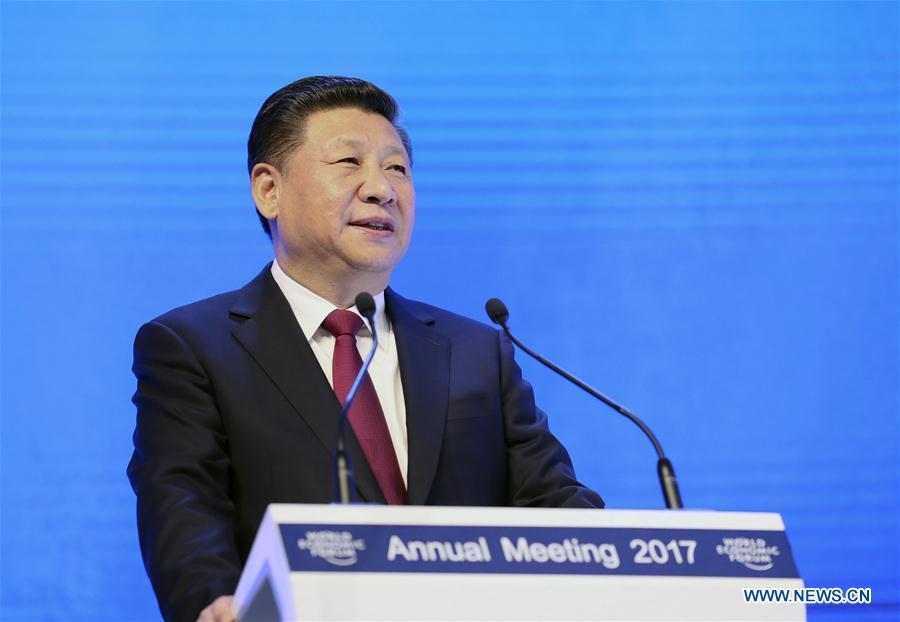
Chinese PresidentXi Jinping?delivers a keynote speech at the opening plenary of the 2017 annual meeting of the World Economic Forum in Davos, Switzerland, Jan. 17, 2017. (Xinhua/Lan Hongguang)
by Xinhua writer Liu Chang
BEIJING, Jan. 18 (Xinhua) -- In recent years, globalization seems to have lost its charm and steam, and most depressively, the direction to go forward.
To gather even tighter or to fall apart, the world community is confronting a critical choice that matters so much for so many.
At the annual World Economic Forum (WEF) in the Swiss ski resort of Davos, Chinese President Xi Jinping shared his line of thoughts about how the world should jointly reset globalization for the better.
In his speech at WEF, one of the most-watched signposts for global economic outlook, Xi tried to gather greater consensus for building a community of common destiny for humankind.
The notion of building such a community was first put forward in 2012. Over the past four years, the Chinese president has traveled around the world to share his thoughts with other world leaders on why this idea could be a more promising approach to revitalize globalization.
According to many of his previous elaborations, this grand experiment needs to be based on openness and inclusiveness.
While stressing the importance of delivering the benefits of economic globalization to all, Xi, in his speech, also pledged China's development will continue to offer opportunities to business communities in other countries.
In the coming five years, China is expected to import 8 trillion U.S. dollars of goods, and make 750 billion dollars of outbound investment, said the president, adding that Chinese tourists will make 700 million overseas visits.
Hailing Xi's keynote speech as a highlight in the WEF history, WEF founder and Executive Chairman Klaus Schwab said Xi's "thought-provoking" speech will chart the course of global economy and that the WEF is willing to further strengthen its partnership with China.
Xi rose to the top of China's leadership after working many years as local officials in some of China's pretty impoverished places in the last century.
He has witnessed how the reform and opening-up policy has reshaped his once-closed country's economy and helped elevate it into the world's second largest one. He understands well that for the world nations, including China, to develop and prosper, they should always treat each other as equals and choose to embrace one another, not the other way around.
More importantly, a major source of the current widespread hostilities against globalization is that it largely favors the privileged few in some of the Western powers.
The most vivid proof of that is the outbreak of the 2008 global financial crisis which was sparked by the greed of Wall Street elites and ended up with the commoners feeling most of the pain both inside and beyond the United States.
That's why a new and fairer globalization should highlight inclusiveness as a key magnetic force that can make sure no one should be left behind.
To materialize such a grand experiment, Beijing has put forward the Belt and Road Initiative that seeks to improve infrastructure in countries joining the program and strengthen their industrial capacity so that they can have the fundamentals to grow their economies.
China is also trying to mend a broken global governance system by championing the establishment of the Asia Infrastructure Investment Bank so that funding gaps left by the post-war institutional arrangements, including the International Monetary Fund and the World Bank, can be covered.
Over the centuries, through trade transactions and human exchanges, most parts of the world have already become more or less interconnected. Reversing the process at this moment of feeble global economic growth would be shortsighted and disastrous.
As finding the right path to globalization is the only rational option, the roadmap Xi has offered could be the wave of the future.



